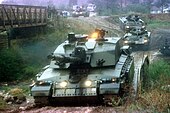Portal:Teleon/Featured Article: Difference between revisions
Philimania (talk | contribs) mNo edit summary |
mNo edit summary |
||
| Line 1: | Line 1: | ||
<div style="float:left;margin:0.5em 0.9em 0.4em 0;">[[File: | <div style="float:left;margin:0.5em 0.9em 0.4em 0;">[[File:Kosovo_Battle_Group_Deploys._05-09-2000._MOD_45137687.jpg|170px]]</div> | ||
''' | The '''Six-Day War''' ({{wpl|German language|Ruthish}}: ''Sechstagekrieg''), also known as the '''July Crisis''' ({{wpl|German language|Ruthish}}: ''Juli-Krise''), was a conflict fought between [[East Ruthen]] and [[West Ruthen]] that began on 20 July 1999 when West Ruthen invaded East Ruthen and ended on 26 July with the signing of the [[Ruthish Armistice Agreement]] and the withdrawal of West Ruthish soldiers from East Ruthen. The war involved combatants from Ruthen as well as x nations as part of the [[United Congress Monitoring Authority for Ruthen]] (UCMAR) which initially supported East Ruthen but later shifted towards monitoring the [[Ruthish Demilitarised Zone]]. It was the first war fought between two nations in [[Calesia]] since the end of the [[Great War (Teleon)|Great War]] and is generally regarded as the closest the world came to descending into full-scale {{wpl|nuclear war}}. ('''[[Six-Day War|See more...]]''') | ||
{{TFArecentlist| | {{TFArecentlist| | ||
*[[Nadauro]] | |||
*[[Combinationalism]] | *[[Combinationalism]] | ||
}} | }} | ||
<div style="float:right;"><span class="plainlinks">'''[https://iiwiki.us/mediawiki/index.php?title=Portal:Teleon/Featured_Article&action=edit Edit featured article]'''</span></div> | <div style="float:right;"><span class="plainlinks">'''[https://iiwiki.us/mediawiki/index.php?title=Portal:Teleon/Featured_Article&action=edit Edit featured article]'''</span></div> | ||
Revision as of 08:31, 2 August 2024
The Six-Day War (Ruthish: Sechstagekrieg), also known as the July Crisis (Ruthish: Juli-Krise), was a conflict fought between East Ruthen and West Ruthen that began on 20 July 1999 when West Ruthen invaded East Ruthen and ended on 26 July with the signing of the Ruthish Armistice Agreement and the withdrawal of West Ruthish soldiers from East Ruthen. The war involved combatants from Ruthen as well as x nations as part of the United Congress Monitoring Authority for Ruthen (UCMAR) which initially supported East Ruthen but later shifted towards monitoring the Ruthish Demilitarised Zone. It was the first war fought between two nations in Calesia since the end of the Great War and is generally regarded as the closest the world came to descending into full-scale nuclear war. (See more...)
